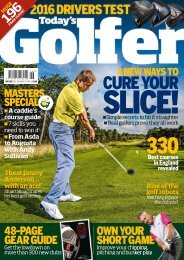Create successful ePaper yourself
Turn your PDF publications into a flip-book with our unique Google optimized e-Paper software.
IAN WOOSNAM<br />
Woosnam has to deal with jibes<br />
from the crowd in the closing round.<br />
I WAS THE FIRST PLAYER TO DO THAT WITHOUT HAVING WON A MAJOR’<br />
to do that without having won a major.<br />
But it was a great boost. I remember<br />
looking around and thinking to myself,<br />
“You’re the best player here.” I had won<br />
the Mediterranean Open earlier that year<br />
and then the New Orleans Open just<br />
before the Masters.<br />
Was winning in America another stepup<br />
for you at that point?<br />
It was the next level up from Europe and<br />
the last one before winning a major.<br />
I looked on that as “climbing the<br />
mountain”. And the top was where<br />
I wanted to reach. So winning in America<br />
was just another step. After that, all I had<br />
to do was win a major. Which isn’t easy,<br />
of course. Until then I had tended to put<br />
myself under too much pressure in the<br />
majors. But at the end of the day they are<br />
all just another tournament. That was<br />
how I tried to treat it.<br />
I’m not sure anyone was writing about it<br />
at the time, but the other four members<br />
of the so-called ‘Big Five’ – Seve, Faldo,<br />
Langer and Sandy – had already won<br />
majors by 1991. Were you feeling any<br />
pressure from that?<br />
I was. Although I was world number one,<br />
I wanted and needed to put that right.<br />
I hadn’t done it. But I always felt like, if<br />
I were to win one, it would be the Masters<br />
or the Open.<br />
Why do you say that?<br />
I didn’t feel like I had much of a chance in<br />
the other two majors, although I had been<br />
second in the US Open a couple of years<br />
before, behind Curtis Strange. But I didn’t<br />
feel my short game was good enough to<br />
win in America. I needed to get lucky and<br />
my chipping and putting be really on for<br />
me to win a major there. Everything had<br />
to click. I knew I was headed in the right<br />
direction, though. My putting was coming<br />
on and that was helping my chipping.<br />
There was less pressure to chip close<br />
because I was putting so well. And that<br />
helps the long game too. I always knew<br />
when I was about to win. I could just tell<br />
by the way I was playing.<br />
So how were you feeling when you got<br />
to Augusta?<br />
I was using a Ping putter when I got there.<br />
And, although I had just won with it in<br />
New Orleans, the victory had more to do<br />
with my long game than my putting. In<br />
the first round of the Masters that<br />
uneasiness continued. So I changed my<br />
putter before the second day. After the<br />
opening round I was on the practice green<br />
for four hours. At first I was working with<br />
the Ping. But when I tried a Tad Moore<br />
I found I couldn’t miss from close range.<br />
So I went with it the rest of the week. It<br />
worked too. I felt like I could go for the<br />
longer putts a bit more as I was holing the<br />
ones back. I was more aggressive. And<br />
I went 66-67 the next two days.<br />
Short putting is so important at the<br />
Masters, isn’t it? The ball is always<br />
trickling off to that awkward 3ft<br />
distance.<br />
There is so much borrow on so many<br />
putts. But being confident with the short<br />
ones meant I could allow a little less-break<br />
May 20<strong>16</strong> Golf World 41
















